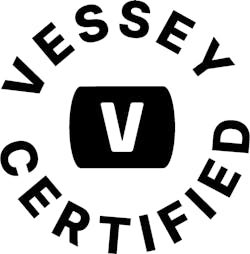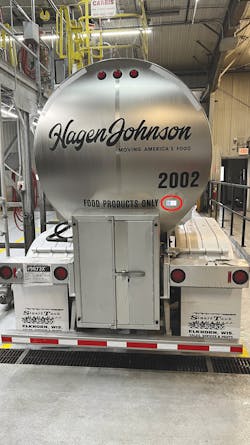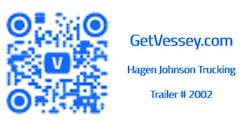Wisconsin cheesemaker to pilot new system for verifying tank trailer cleans
The idea is simple enough: Everybody receives credit for the work they’re doing.
The execution is more complicated—it involves bewildering blockchain technology—but the goal is commendable: To digitally document the entire life of a vessel used to transport food with immutable records easily accessed with any device. And the delivery vehicle for this food safety platform is dubbed Vessey, a proprietary new product from the people behind the Hagen Johnson Group in Wisconsin.
Essentially, using Vessey, everyone along the food supply chain would be able to access critical information, from wash certificates and seals to insurance coverage, through a QR code affixed to the container—in this case a liquid tank trailer—an app on their Apple or Android phone or tablet, or a desktop computer.
“Vessey is an idea our company brought to life with the help of a U.S. Department of Agriculture [USDA] grant,” explained Brandon Johnson, president and chief vision officer with the Hagen Johnson Group, which includes Liquid Freight, Hagen Tank Wash, and Hagen Johnson Trucking. “There are multiple stakeholders with this product—the vessel owner, tank wash facility, shipping/receiving facility, insurance company, and regulatory bodies—and, in its simplest form, it’s a ‘go-or-no-go’ gauge for a trailer.”
After a year in development, the company now is ready to pilot the blockchain system with artisan cheese maker Cedar Grove Cheese in Plain, Wisconsin. The plan is to begin testing Vessey this month, using additional grant funding from the Wisconsin Department of Agriculture, Trade & Consumer Protection (WDATCP), then roll it out to larger food manufacturers, tank-cleaning facilities, and for-hire tank carriers this summer.
“It’d be a big step forward for the dairy industry, and beyond that, any liquids that are being transported, for us to have this kind of traceability and information for food safety purposes,” said Bob Wills, Cedar Grove’s owner.
“I’m very excited about the program.”
Project development
Hagen Logistics, dba Liquid Freight, began pursuing the project two years ago. Johnson and his team secured a $100,000 grant through the USDA National Institute of Food and Agriculture’s Small Business Innovation Research program in June 2021, and completed Phase I work in March 2022. That work included the development of a working model in partnership with Tim Leonard, senior vice president of business innovation at Kleinschmidt, to develop a first-of-its-kind blockchain environment, along with UI/UX development and web application work by Earthling Interactive, and branding/UX work by Swink, both long-term partners with the Liquid Freight team.
On the blockchain side, which is at the core of Vessey’s trust component, Leonard’s extensive transportation industry experience—which includes stints as chief technology officer with TMW Systems/Trimble Transportation, executive technology officer at General Motors, CTO/VP for U.S. Xpress, and a trucking-company owner—made him and the Kleinschmidt team, led by CEO Dan Heinen, the perfect partner for the project. In the time since Phase I completion, Leonard and Kleinschmidt have completely rebuilt the blockchain environment to ensure Vessey conforms to the latest Sawtooth/Hyperledger protocols, and is ready for commercial release.
Vessey is built as a standalone app accessible via the QR code—which is tied to the trailer’s vehicle identification number (VIN)—a computer or device, so anyone can input data. Blockchain, a string of unalterable records linked by multiple servers, connects and secures the operating system, ensuring all stakeholders only access relevant data. “Everything is GPS-verified based on location, and each stakeholder’s unique credentials.”
In practice, a shipper, for example, would scan the trailer’s QR code when it arrives at the loading facility. The first information they would see includes a trailer’s various certificates, with expiration dates, and insurance, followed by prior products, where it was cleaned, who approved the wash, and the seals. If the facility accepted the trailer, it would then add new seals or products to the chain.
“Importantly, this product allows for each stakeholder to see what they should see, and no more,” Johnson emphasized.
Pilot testing
Johnson and Wills connected through WDATCP officials, who knew both were going down similarly innovative paths with digital records. “It was nice to hear somebody was on the same wavelength,” Wills said. “And I knew their reputation but didn’t know they were into this aspect of the business, so it’s been interesting to share ideas.”
Wills, who also owns Clock Shadow Creamery, has run Cedar Grove for 34 years. The factory, which opened in 1878, produces 12,000 lbs. of organic and conventional cheeses each day that are shipped across the country. Cedar Grove also picks up milk from 28 local farms using four company-owned tank wagons (three are Freightliners with chassis-mounted Walker tanks) ships whey—a byproduct of the cheesemaking process—with contract carriers, and has its own grade-A wash facility, making the operation an ideal test case.
Cedar Grove currently uses QR codes on its cheese packaging to make information available to customers, including the vat that produced the cheese, batch size, and the origin of the component ingredients. “At this point, we have tracking going back to the bulk tanks in our factory,” Wills said. “But our milk pick-up system still is mostly manual. We have records but they’re all paper records. So, for us, the appeal of this project is being able to integrate our electronic system all the way back to the farm level.”
The pilot will include local dairy farmers and contract carriers. The objective is to “firm up” the blockchain system’s environment before approaching major producers and shippers, third-party tank washes, and finally carriers who own the trailers that will be catalogued, and thus would have the great access. “If there’s anyone in the industry who needs to see how this works, it’s the carriers,” Johnson said.
Collective benefits
Regulatory authorities like WDATCP, USDA, and the U.S. Food and Drug Administration (FDA) are promoting the use of blockchain technology to advance food safety, and Vessey is a tool that allows for non-fragmented digitization of essential records. Auditors also would be able to use Vessey to verify data more quickly with one platform. “They’re excited about it,” Johnson said. “[WDATCP] has been looking at ways to get funding for this because they also want digitization of records, and so they really want to go this direction.”
Regulators aren’t the only stakeholders who would benefit, he maintained.
Shippers could use Vessey to trace the origin of a product in the event of a recall, or to avoid contaminating a product with allergens. Insurers could use it to verify shippers and carriers have the correct amount of insurance for a food-grade vessel; tank washes could make sure they’re only cleaning the products they say the can clean, so as not to jeopardize their Kosher status, for instance; and tank owners would receive credit for carrying out good food-safety practices.
“Unless you’re skirting the system, or trying to keep blind spots hidden, you should be excited about this because you get credit for the honest work you’re doing,” Johnson said.
Future deployment
Vessey could help set an industry standard for digital wash certificates in the future, Johnson speculated. And tank manufacturers could etch the QR codes into the trailers for further supply chain security. In anticipation of bringing Vessey to market, Johnson locked up getvessy.com and is mapping out a way to pay for its development. Carriers likely would pay a fee to register vessels, shippers or tank wash operators would pay to digitally record the affixed seals to clean or loaded trailers, and auditors would pay to run checks.
“We’re hoping that, in five years, every person involved in a tank’s journey is logging its life events,” Johnson said.
“It’s something that needs to happen for the industry,” he said.
Wills, for one, agrees. “It’s going to have to become the industry standard at some point for this whole thing to reach its full potential,” he said.
“But we’re just trying to take baby steps here.”
About the Author
Jason McDaniel
Jason McDaniel, based in the Houston TX area, has more than 20 years of experience as an award-winning journalist. He spent 15 writing and editing for daily newspapers, including the Houston Chronicle, and began covering the commercial vehicle industry in 2018. He was named editor of Bulk Transporter and Refrigerated Transporter magazines in July 2020.





